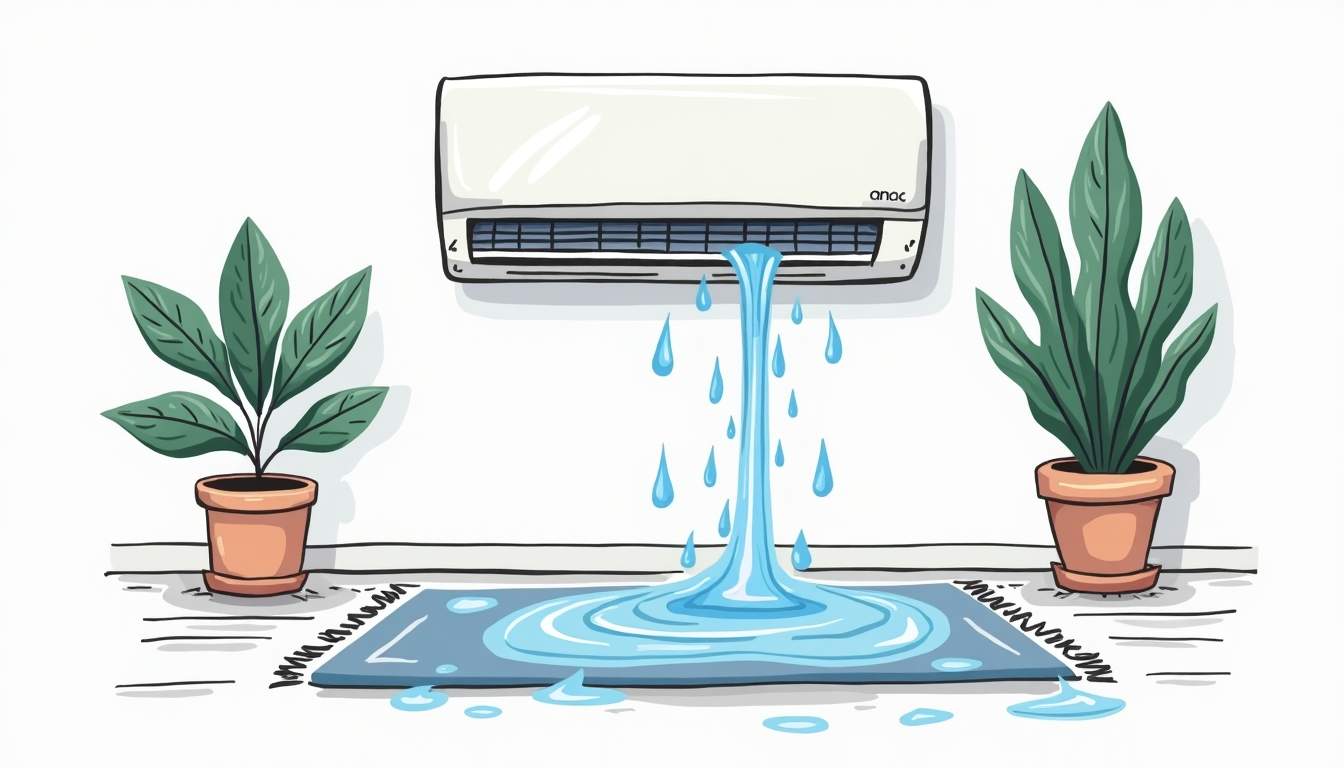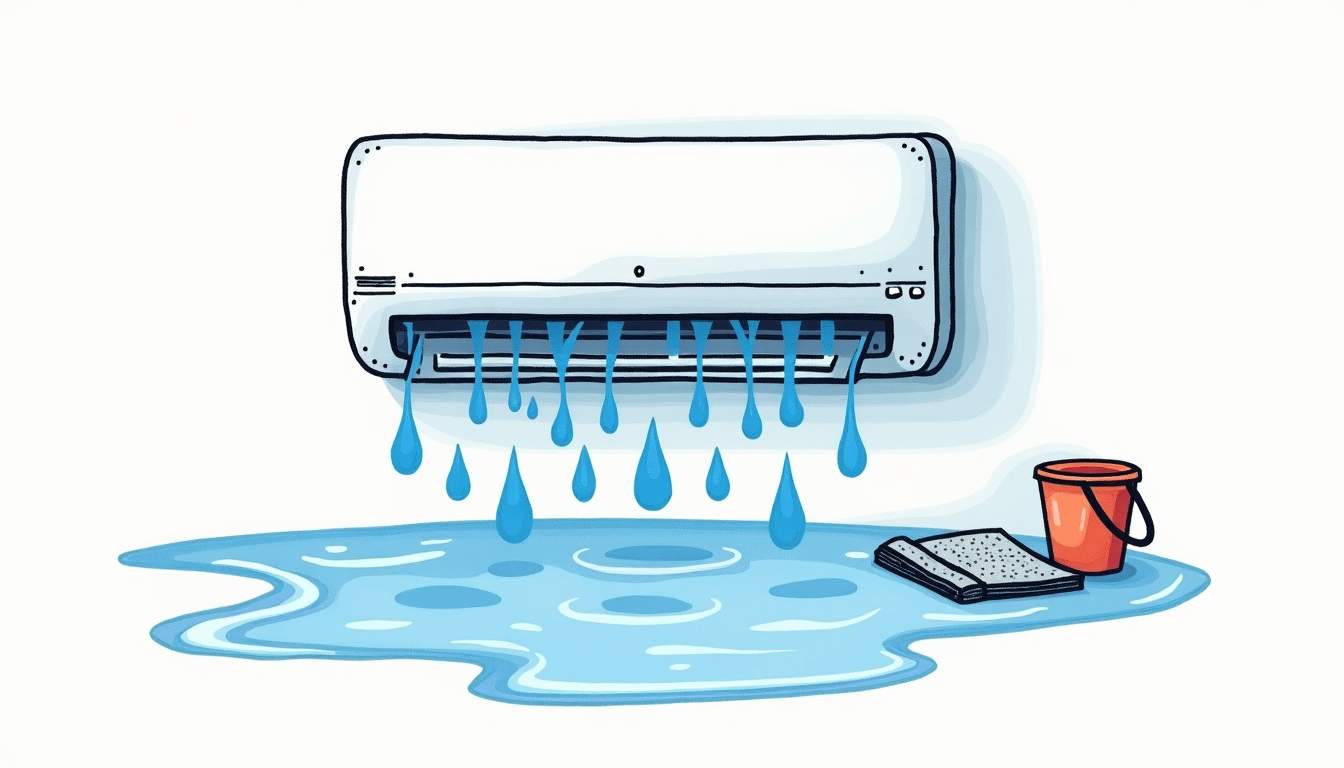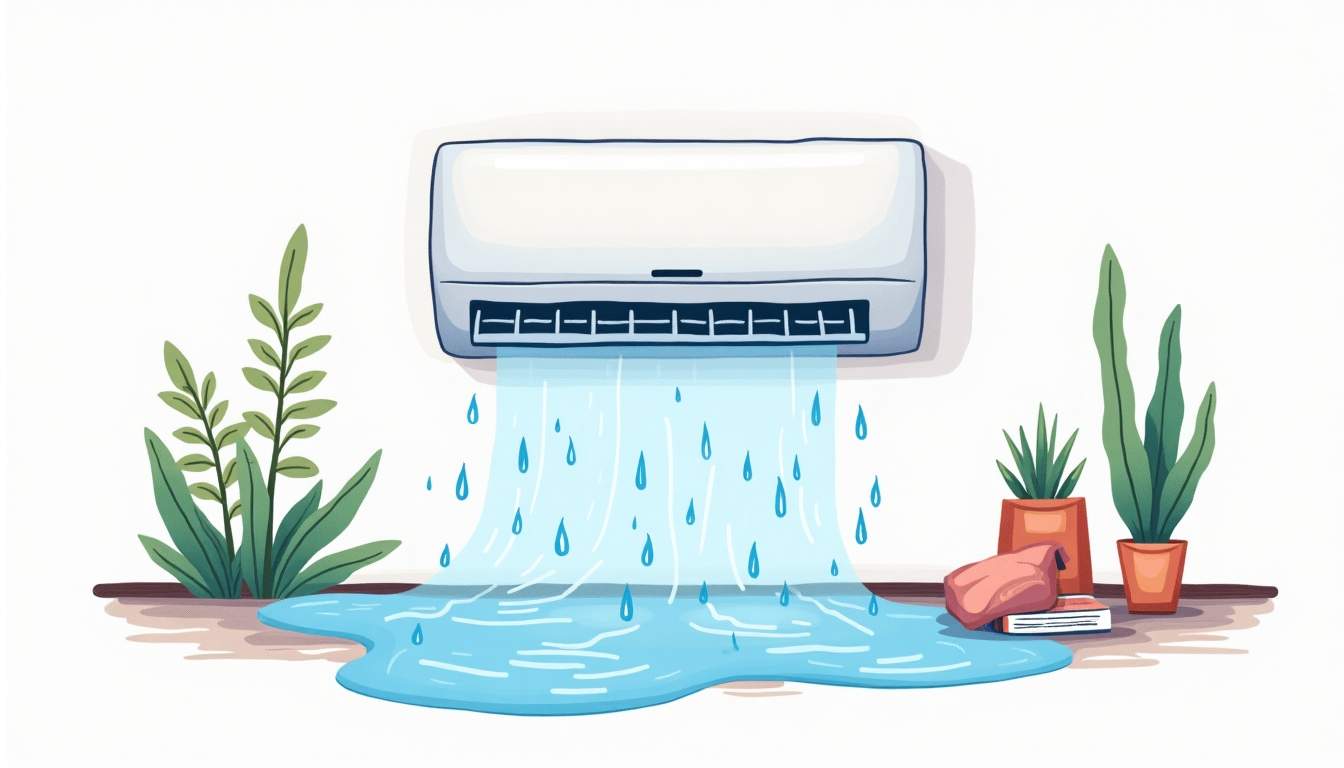It’s a hot day, and your air conditioner is humming along, providing much-needed relief. Then you notice a puddle forming beneath the unit. Water dripping from an AC isn’t just annoying-it can signal a problem that needs attention. Ignoring it might lead to bigger issues, including damage to your home or a less efficient cooling system. So, what’s causing that leak, and how can you fix it?
Why Is Your AC Leaking Water?
Air conditioners naturally produce condensation. When warm air hits the cold evaporator coil inside the unit, moisture in the air turns into water droplets. Normally, this water drains away harmlessly through a drain line. But when water starts pooling or dripping where it shouldn’t, something’s off.

Clogged Drain Line
The most common culprit behind water leakage is a clogged condensate drain line. Over time, dirt, dust, and algae can build up inside the drain pipe, blocking the flow of water. When the drain line is blocked, water backs up and leaks out of the unit instead of draining away.
It’s a simple fix but one that requires regular maintenance. If you notice water pooling near the indoor unit or dripping from the vents, the drain line is a prime suspect. Regularly flushing the drain line with a mixture of vinegar and water can help prevent clogs. Additionally, installing a drain line access port can make it easier to clean and maintain the line, ensuring that your AC operates smoothly and efficiently.
Frozen Evaporator Coil
Another reason for water leakage is a frozen evaporator coil. When the coil freezes, it eventually melts and causes excess water to drip. This freeze-thaw cycle can happen due to low refrigerant levels, poor airflow, or dirty filters.
Frozen coils not only cause leaks but also reduce the efficiency of your AC. If you spot ice on the unit or notice it’s not cooling properly, turn off the system and check for ice buildup. Regularly changing your air filters and ensuring that your vents are unobstructed can significantly improve airflow, reducing the risk of freeze-ups. Additionally, if you suspect low refrigerant levels, it’s crucial to call a professional technician, and you can visit Aircon Servicing for expert assistance, as handling refrigerants requires specialized knowledge and equipment.
Improper Installation or Tilt
Sometimes, the problem isn’t internal but how the unit is installed. Air conditioners need to be slightly tilted to allow water to drain properly. If your AC is perfectly level or tilted the wrong way, water can accumulate and leak inside your home.
Frozen coils not only cause leaks but also reduce the efficiency of your AC. If you spot ice on the unit or notice it’s not cooling properly, turn off the system and check for ice buildup. Regularly changing your air filters and ensuring that your vents are unobstructed can significantly improve airflow, reducing the risk of freeze-ups. Additionally, if you suspect low refrigerant levels, it’s crucial to call a professional technician, and you can visit Aircon Servicing for expert assistance, as handling refrigerants requires specialized knowledge and equipment.
How to Fix a Leaking AC Unit
Once you’ve identified the cause, it’s time to take action. Some fixes you can handle yourself, while others might require professional help.
Clearing the Drain Line
Start by locating the condensate drain line. It usually looks like a small PVC pipe near the indoor unit. You can try flushing it with a mixture of bleach and water to clear algae and debris. Use a funnel to pour the solution slowly into the drain line.
If you’re comfortable, a wet/dry vacuum can be used to suck out blockages from the drain line’s end. This method is often very effective at removing stubborn clogs. Additionally, consider using a pipe cleaner or a flexible brush to reach deeper into the line if you suspect there’s a more significant buildup. Regular maintenance of the drain line is crucial; doing this at least twice a year can prevent future leaks and ensure your AC operates efficiently.
Replacing or Cleaning the Air Filter
A dirty air filter restricts airflow, which can cause the evaporator coil to freeze. Check your filter monthly and replace or clean it as needed. A clean filter helps maintain proper airflow and prevents ice buildup. Remember that the type of filter you choose can also impact your AC’s performance; high-efficiency particulate air (HEPA) filters can trap smaller particles and allergens, improving indoor air quality while keeping your system running smoothly.
Checking the Refrigerant Levels
Low refrigerant can cause the evaporator coil to freeze, leading to leaks when the ice melts. Unfortunately, checking and refilling refrigerant isn’t a DIY job—it requires specialized tools and knowledge. If you suspect low refrigerant, call a licensed HVAC technician. They can also check for leaks in the system, which can lead to further issues if not addressed promptly. Regular maintenance checks can help catch refrigerant issues before they escalate, saving you both time and money in the long run.
Adjusting the Unit’s Tilt
If your AC isn’t draining properly due to poor installation, try gently tilting it so the drain pan slopes toward the drain line. For window units, loosening the mounting brackets and adjusting the angle can help. Be cautious not to tilt it too much, as that can cause other issues. It’s also a good idea to inspect the surrounding area for any obstructions that may be preventing proper drainage, such as dirt or debris accumulating around the unit. Keeping the area clean and ensuring that the unit is level can significantly enhance its performance and longevity.
Preventing Future AC Leaks
Fixing the leak is one thing, but preventing it from happening again saves time and headaches.
Regular Maintenance
Schedule routine maintenance for your AC system. This includes cleaning or replacing filters, inspecting the drain line, and checking for any signs of wear or damage. A well-maintained system runs more efficiently and is less likely to develop leaks. Additionally, consider hiring a professional technician at least once a year to conduct a thorough inspection. They can identify potential issues that may not be obvious to the untrained eye, such as refrigerant levels or electrical connections, ensuring that your system operates at peak performance.
Keep the Drain Line Clear
Flush the condensate drain line with a bleach solution every few months to prevent algae buildup. This simple step can keep water flowing freely and avoid clogs. You might also want to install a drain pan overflow switch, which can alert you to any blockages before they lead to significant water damage. Keeping the area around the drain line clean and free of debris can further enhance its efficiency, allowing for optimal drainage and reducing the risk of leaks.
Monitor Your AC’s Performance
Pay attention to any changes in cooling efficiency or unusual noises. Early detection of problems like frozen coils or refrigerant leaks can prevent water damage and costly repairs. It’s also wise to keep an eye on your energy bills; a sudden spike can indicate that your AC is working harder than it should due to an underlying issue. Regularly checking the thermostat settings and ensuring they are accurate can help maintain a comfortable environment while preventing unnecessary strain on the system.
When to Call a Professional
Some AC problems require more than a quick fix. If you’ve tried basic troubleshooting and the leak persists, it’s time to get expert help. Ignoring these issues can lead to more extensive damage, increased repair costs, and even safety hazards in your home. Therefore, recognizing the signs that warrant a professional’s attention is crucial for maintaining your system’s efficiency and longevity.
Persistent or Large Leaks
If water continues to leak despite clearing the drain line and adjusting the unit, there might be a more serious issue, such as a cracked drain pan or faulty internal components. Additionally, persistent leaks can lead to mold growth, which poses health risks to you and your family. It’s essential to address these leaks promptly to prevent water damage to your home’s structure and belongings. A professional can not only identify the source of the leak but also provide solutions to prevent future occurrences.
Refrigerant Issues
Handling refrigerant requires certification and specialized tools. Don’t attempt to recharge or repair refrigerant leaks yourself. Contact a licensed HVAC technician to safely diagnose and fix the problem. Refrigerant plays a critical role in your AC’s cooling process, and improper handling can lead to environmental hazards and regulatory issues. A qualified technician will ensure that your system is not only functioning efficiently but also compliant with local regulations regarding refrigerant use.
Electrical or Mechanical Problems
Leaks can sometimes be a symptom of electrical malfunctions or damaged parts. Professionals can perform a thorough inspection and repair or replace components as needed. Electrical issues can manifest in various ways, such as unusual noises, inconsistent cooling, or even complete system failure. An expert will have the knowledge to trace these problems back to their root causes, ensuring that your air conditioning unit operates safely and effectively. Furthermore, they can provide valuable maintenance tips to help you avoid similar issues in the future, ensuring your system runs smoothly for years to come.
Protecting Your Home from Water Damage
Water leakage from an AC can damage floors, walls, and furniture. It’s important to act quickly to minimize harm.

Use a Drip Pan or Tray
Placing a drip pan under the indoor unit can catch leaking water and prevent it from spreading. Make sure the pan is emptied regularly to avoid overflow.
Seal Leaks Promptly
If water has already caused damage, dry the area immediately and repair any affected surfaces. Mold and mildew can develop quickly in damp conditions, so thorough drying is essential.
Consider a Leak Detector
Installing a water leak detector near your AC unit can alert you to leaks early. These devices can save you from costly repairs by catching problems before they escalate.
Final Thoughts
Water leakage from your air conditioner is a common issue but one that shouldn’t be ignored. Identifying the cause-whether it’s a clogged drain line, frozen coil, or installation problem-helps you take the right steps to fix it.

Regular maintenance and monitoring can prevent leaks and keep your AC running smoothly. When in doubt, don’t hesitate to call a professional to avoid bigger headaches down the road. A little attention today can save you from a soggy mess tomorrow.
 WhatsApp Us Now
WhatsApp Us Now

